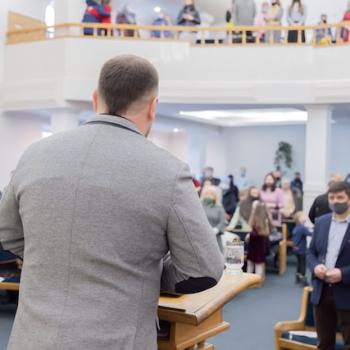
Looking to the Bible for guidance, as I wrote about last week, is a little more complex than it might seem.
One part of the complexity is this: The idea of looking to the Bible for guidance can easily get twisted. In particular, it can get twisted into authoritarianism.
Or, authoritarian leaders can twist it to uphold their own oversized authority. This is a problem. How, then, do we read the Bible for guidance but avoid authoritarianism?
Biblical: A Magical (Authoritarian) Word
I was struck recently by Brian McLaren’s reflections on his experience of parenting. In Do I Stay Christian?, McLaren writes this:
“My approach to parenting was strongly influenced by Christian leaders whose teachings I am now repulsed by. I trusted those leaders because they were respected in the Evangelical community to which I belonged and because they used a magic word, biblical, to describe their teaching. Now, I’ve come to see that what they called biblical was actually authoritarian, and I am coming to terms with how much better a parent I could have been if I had found better teachers.”
Biblical: a magical word. Used to mean: Listen to me. I know best. This is what you should do. Obey, or else.
This is what (at least at our best) we don’t want. We want guidance. But we want to avoid authoritarianism.
There was a time when I didn’t really think twice when someone called something biblical or unbiblical. Now, I am a little more careful.
Now I realize, as McLaren did when it came to parenting, that pastors and other religious leaders often use these words in ways that are manipulative and disingenuous.
This is not okay. What is or isn’t biblical has to do with communities wrestling with the stories of scripture together, listening carefully to one another and especially to those who are most vulnerable in our world. It has nothing to do with what a religious leader tells people in order to gain and maintain control over them.
“Biblical” Marriages
For something to be biblical, it has to involve actual Bible texts, not just what a preacher or Christian radio host says. And, if “biblical” means “apply this to your life and live in this way,” it has to involve some thoughtful interpretation of what those texts mean for us today.
It has to involve everyone thinking, and praying, and looking for God in our lives and our world and the scriptures passed down to us.
I think of the meme going around about “biblical” marriage. Unfortunately I’m not sure of its origin, but here’s a blog where it’s posted. Take a look, if you haven’t yet.
There are all sorts of different kinds of marriages that made it into the stories the Bible tells. Are all of them good? Of course not.
So there’s the question of what’s “biblical,” as in what exists in the Bible. And then there’s the question of which of these models from the Bible are meant to be followed—and which are meant to be avoided like the plague.
It is our responsibility as individuals and as communities of faith—everyone’s voices heard, and especially those most impacted by the issue—to wrestle with these questions.
It’s Okay to Leave Authoritarian Communities
The word biblical can hold many different meanings. But whenever it starts to mean this is the One Right Way, and you can trust that because I’m an authority figure, well, I would say it’s time to get out.
That goes for when a Christian leader says there’s one right way to discipline your kids. And it goes for when a pastor says there’s one right way to be married.
Too many churches operate in this way. But the Bible itself is full of people and communities who wrestled. In the Bible, leaders who manipulate people are not presented as positive role models.
There are churches that are not like this. There are churches where the Bible is a source of guidance and not a coverup for authoritarianism. Churches where leaders read and try to understand scripture alongside the rest of the community. Where pastors hope to encourage and inspire but not manipulate or control.
To those who have experienced church as an authoritarian space, I would say this: It’s okay to expect better. It’s good to expect better. It’s okay to leave a religious community that is trying to tell you what to think rather than encouraging you to think for yourself. And it’s not okay for church leaders to use it’s biblical to cover over a multitude of sins.
Here’s to more guidance and less authoritarianism. More love and less manipulation. More freedom and less control. And to walking out the doors of buildings and theologies that have tried to control rather than liberate us.












